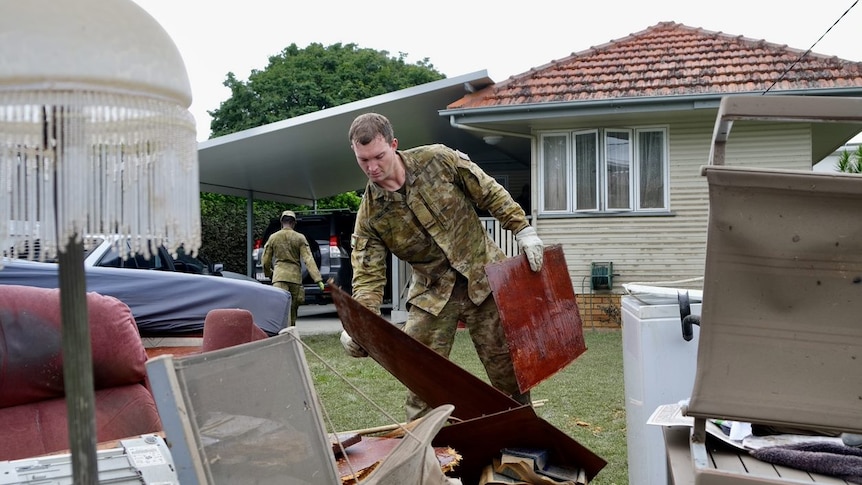Queensland councils want to mandate flood risk disclosures for property buyers, with one south-east mayor describing the move as “common sense”.
Key points:
- A property’s flood risk should be disclosed to potential buyers, Queensland councils say
- The new push comes as hundreds of homeowners register for voluntary buy-backs after the recent floods
- The government is considering a statutory disclosure scheme but the LGAQ says it’s not strong enough
Moreton Bay Regional Council Mayor Peter Flannery said his council would take the proposal to the Local Government Association of Queensland conference in October.
“Personally, I think this is common sense and some property buyers are entitled to know prior to purchase,” Mr Flannery said.
“This might be as simple as mandatory disclosures of flood and other natural hazard risks during the property conveyancing process or other due diligence searches.
“I think this is an important and easy change for the state government, and I’m confident of getting the support of Queensland’s other councils.”
So far, more than 4,250 residents have registered their interest to have their homes raised, rebuilt or voluntarily bought back under the state’s $741 million Resilient Homes Fund, announced after the February floods.
Of the 443 home owners registered for a voluntary buy-back, 70 per cent live in Brisbane and Ipswich.
Brisbane Lord Mayor Adrian Schrinner threw his support behind Moreton Bay’s proposal.
“You wouldn’t buy a home without first getting a pest inspection, yet flooding risks can be so much destructive and costly than termites,” Mr Schrinner said.
“It makes sense that buyers should be fully aware of any flood or natural disaster risks before buying.”
Proposed seller disclosure program
Deputy Premier and State Development Minister Steven Miles says Queensland “has to do better” to account for the impacts of climate change.
“In the short term, we’re looking at ways to make it easier and quicker for local governments to change their local planning schemes to respond to the effects of flooding,” he said.
“We’re also looking at ways to make sure natural hazard risk is disclosed to prospective buyers, so they’re aware of potential risks.”
Queensland is calling for submissions on a proposed statutory seller disclosure program.
Currently, it has no formal system, with sellers having to meet a mix of common law, statutory and contractual obligations.
Local Government Association of Queensland chief executive Alison Smith said mandating flood risk disclosure would put Queensland on a par with NSW and Victoria.
“The state is currently calling for submissions on its proposed statutory seller disclosure requirements, and the LGAQ and its member councils will be submitting that the current draft does not go far enough, and should include floods and other natural hazard information,” she said.
Flood mapping complicated
But Real Estate Institute of Queensland chief executive Antonia Mercorella said while mandating disclosure sounded simple, it could become complex when determining what a property’s level of flood risk was.
“Flooding happens for a number of reasons, so we need to be careful about what even constitutes a flood, what are the causes of a flood,” she said.
“Flood mapping is becoming more sophisticated. It’s becoming more reliable, but ultimately Mother Nature keeps surprising us.
“Just because a property hasn’t flooded previously, I don’t think that necessarily means it won’t flood in the future.
“And similarly, just because a property has flooded in the past doesn’t necessarily mean it will flood again in the future.”
.
